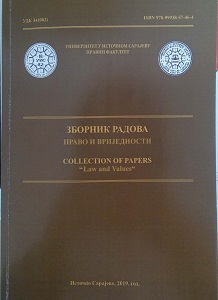
Osvrt na Zakon o liječenju neplodnosti biomedicinski potpomognutom oplodnjom Federacije Bosne i Hercegovine
Medically assisted fertilization has been a topic of great interest during the last decades both from the medical and the legal point of view, largely owing to the great successes in the field of reproductive medicine. An at- tempt to legally standardize it in certain countries provokes a heated debate within the wider public, since it does not only affect the interests of individuals but also the interests of the entire community.Until recently, in Bosnia and Herzegovina, there was no special regulation on medically assisted fertilization, but it was treated only within family laws in both Entities and the Brčko District of Bosnia and Herzegovina, in provisions regulating the issue of parenting of a child conceived by medically assisted fertilization. Apart from this, at the entity and Brčko District level, respectively the cantons in the Federation of Bosnia and Herzegovina, the issue of financing the costs of the procedures of medically assisted fertilization has been regulated in a sporadic and mutually incompatible manner, which places patients in Bosnia and Herzegovina who wish to undergo these procedures in an unequal position. In June 2018, the Parliament of the Federation of Bosnia and Herzegovina adopted the Law on the Treatment of Infertility with Biomedically Assisted Fertilization, thus ending the multi-year process of adopting this extremely important piece of legislation in the field of healthcare and bringing Bosnia and Herzegovina closer to the countries in the region that have regulated this issue in its entirety.The provisions of the above Law are presented and analyzed in this pa- per. In addition, a comparative review with the provisions of the same laws of the countries of the region (Serbia, Croatia, Slovenia, Macedonia and Montenegro) and the European Union regulations in this area is presented to determine the advantages and disadvantages of the newly adopted legal solutions and determine the degree of its compatibility with the acquis of the European Union.
More...

